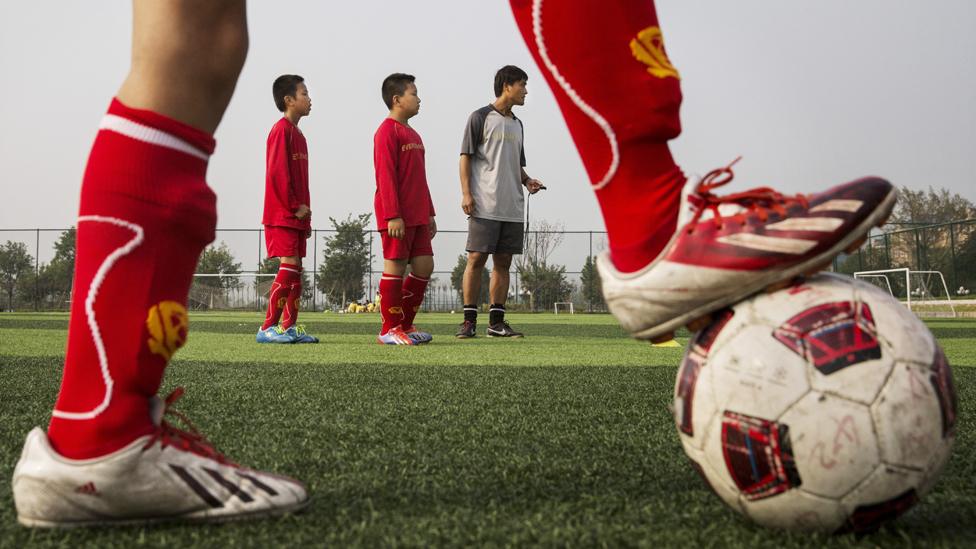China's football future: The mountain school producing prodigies
- Published
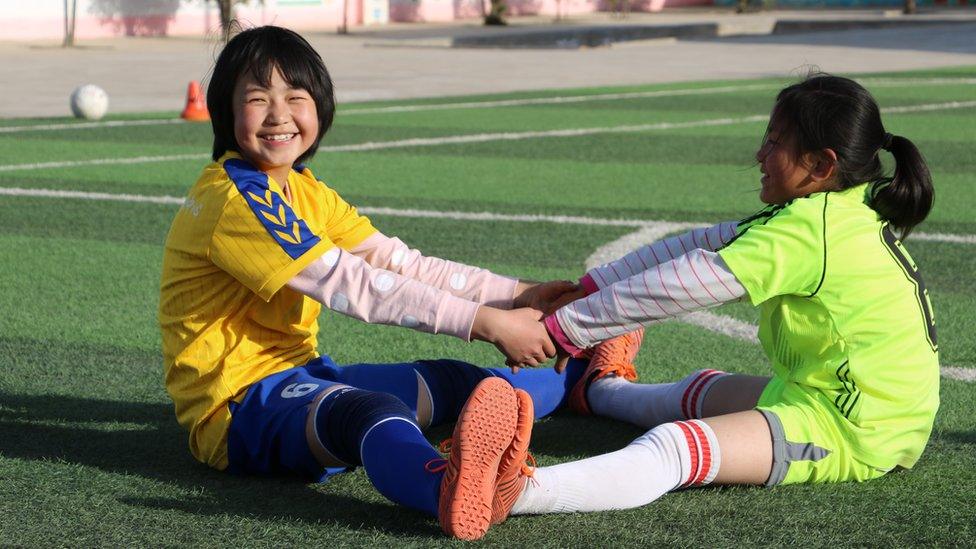
Wang Chun (left) dreams of playing for China's national team
It's just after dawn in the mountains of Gansu province, north-central China, and 40 children are beginning their first football practice of the day.
One girl stands out from the rest: the girls' football captain, 12-year-old Wang Chun. She's taller than many of the other girls and looks unusually focused.
The stakes are high. Wang Chun has an important audition coming up that could help her escape poverty in this remote, dusty corner of China.
In two months, she'll try out at one of China's top football academies - Evergrande, in China's southern Guangdong province - more than 2,000km (1,200 miles) away.
For now, Wang Chun and the others at the Zhonglianchuan primary school focus on perfecting their passes. The headmaster, Ma Anwu, stands in the middle of the neon green pitch. He doubles as the main coach.
When Mr Ma arrived at this downtrodden school eight years ago, he soon decided that almost all of the children would play football for three hours a day in addition to their normal lessons. They play even in the winter, when the temperature can drop to -20C.
"If the kids taste a bit of bitterness when they are young, then they can taste the sweetness of the fruit when they're older," he says.
A chance to make a new life
Mr Ma has good reason to be confident. The school has already sent six children to China's top football academy - on full scholarships. Two of its graduates are playing in China's professional football super league. And the school's students have gone abroad too - to the UK for training stints with Arsenal and Stoke City.
Thanks to a rich Chinese benefactor, these children have access to a whole new world of travel and opportunity, totally unattainable for their parents' generation. The school is doing so well that it's about to be named a model school for the entire country.
The reason there is so much money and influence swirling around football in China is due - in large part - to China's all-powerful President Xi Jinping. He's the country's most famous football fan and he's made it clear that he wants China to qualify for, host and even win a World Cup by 2050.
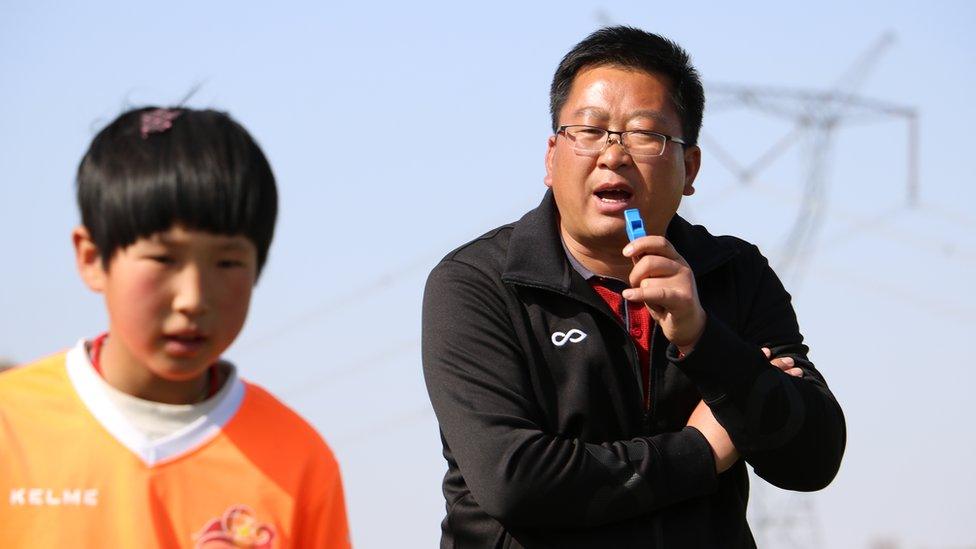
Ma Anwu has groomed talents that could help achieve President Xi's dreams for Chinese football
Mr Xi has wielded his position like no Chinese leader for decades, championing China's economic and military strides while overseeing a fierce internal anti-corruption campaign that has conveniently targeted political rivals. More than a million officials from the ruling Communist Party have been disciplined so far.
Censorship and political oppression have also risen to new heights, as the party leadership makes it known that even the blandest of opposition won't be tolerated. So, when the president makes it clear - repeatedly - that he wants China to transform itself into a football powerhouse, he won't be ignored.
Wang Chun's older sister is already playing a part in Mr Xi's grand football vision: she's made it to the Evergrande Academy. Now it's the younger girl's turn to try to get in.
"I'm excited," she says with a smile. "Without football, I wouldn't be as happy as I am now."
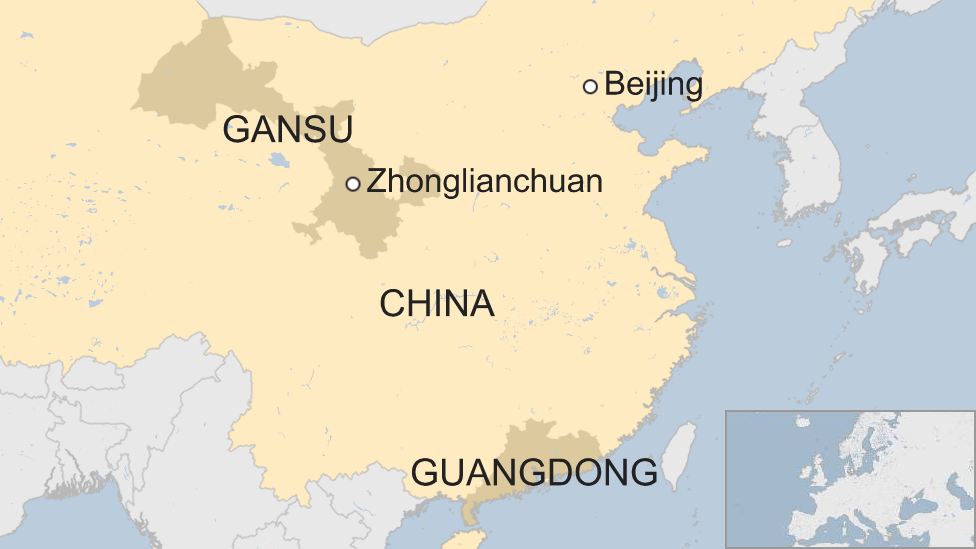
"But what about when you have to get up and play in the snow in the early morning?" I ask. Surely she gets frozen fingers and toes?
"The only problem is that the football won't roll properly in the snow," she shrugs.
The children at this school are tough. Most of them live at the school during the week because their parents have no choice but to work in faraway cities. They don't complain, in part, because they're keenly aware that very few children in this area get the chance to attend a school like this.

China's World Cup Dreams
Listen to the BBC World Service documentary:
The school training “left-behind children” in the hope some will get to the World Cup

Gansu is one of the poorest provinces in China - local officials tell us that the average earnings are just $500-$800 (£450-£650) a year. These kids - at least - have a chance to make a new life for themselves by playing football.
Great embarrassment
China is on a mission to eradicate extreme poverty in this part of Gansu by the end of the year and within the rest of the country in three years. Exactly how they'll do that so quickly isn't clear.
Questions remain, too, about how China will fulfil its football ambitions. While China's women's national team has shown some promise over the past decade, the men's team is a source of bubbling frustration.
China has only ever qualified for the men's World Cup once - in 2002, but it lost all three of its games.
"It's been a source of great embarrassment that they can't find 11 capable men to compete on the world stage," says Mark Dryer, a British sports blogger with a passion for Chinese football.
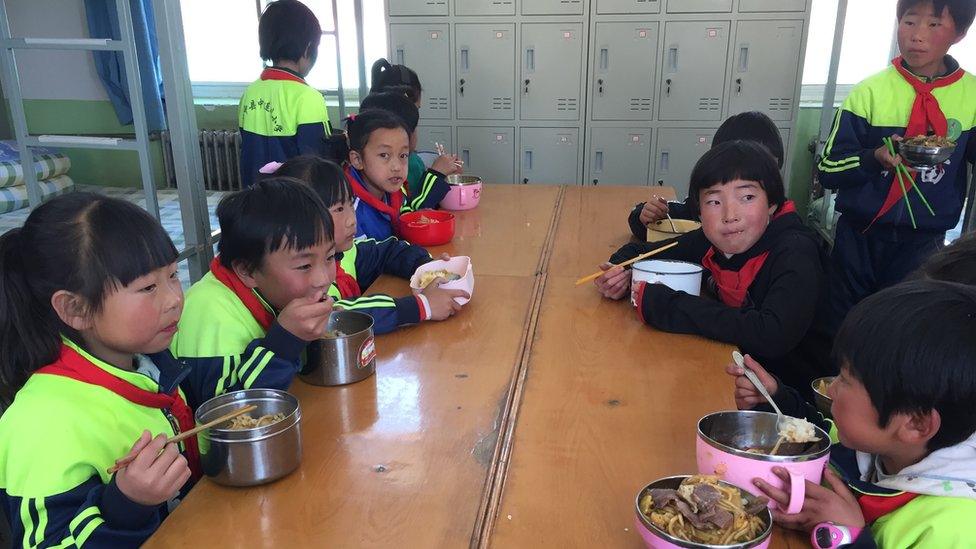
Gansu is one of the poorest provinces in China
"Historically, China has excelled in very disciplined sports. So if you get 10,000 people and put them in a swimming pool and they just have to do a million dives over their career, you'll probably get someone winning a gold medal at some of those individual, repetitive sports.
"Football is the opposite of that. You have to be creative, you have to do the unexpected. If everyone knows what you're going to do when you have the ball at your feet, you're not going to get anywhere."
It takes decades to foster real football talent - the kind that shines at the World Cup. Though China has proven itself to be an economic, a military and even a technological force to be reckoned with, it can't rush football. And maybe to excel, it just needs to have a bit more fun.
"There was a Spanish coach, I believe, at one of the Real Madrid-affiliated academies here," Mark says. "And he said that when he first came over he'd never seen kids playing football in silence.
"He said he had to actually encourage them to give each other a hug or a high five after they'd scored a goal."
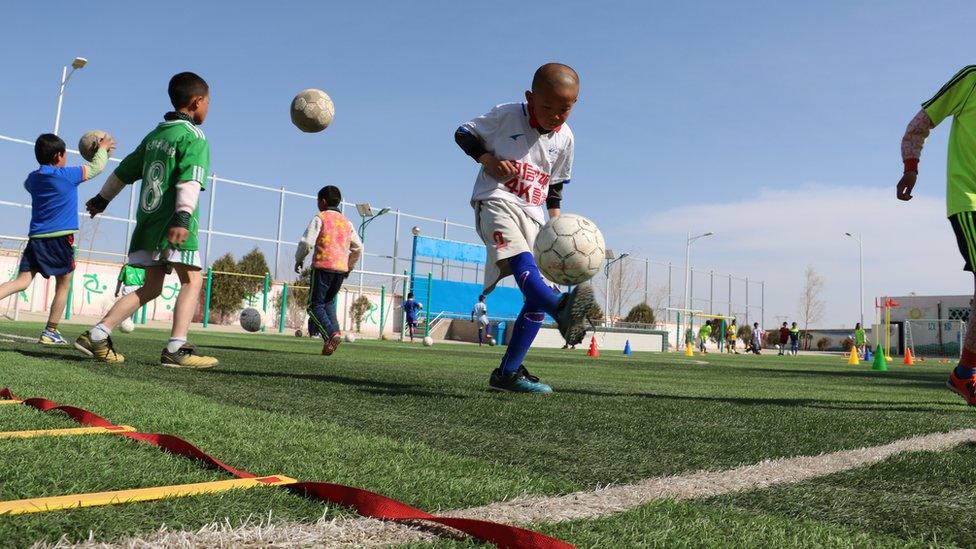
Most of the children at this school live on campus - because their parents have to travel to find work
'I worry I'm going to let them down'
At Zhonglianchuan primary school, coach Ma is trying to pass on a true passion for football to his students.
Part of that involves watching the professionals at work. One night when we visit, more than a dozen of the older children squeeze into a tiny room to watch one of the school's only televisions. China's women's team is playing the Philippines.
Wang Chun seems tired. But she watches the match intently.
"There's pressure from my parents," she admits. "If I don't do well in football I worry that I'm going to let them down."
And with that, she turns back to watch the game. China would go on to win 3-0.
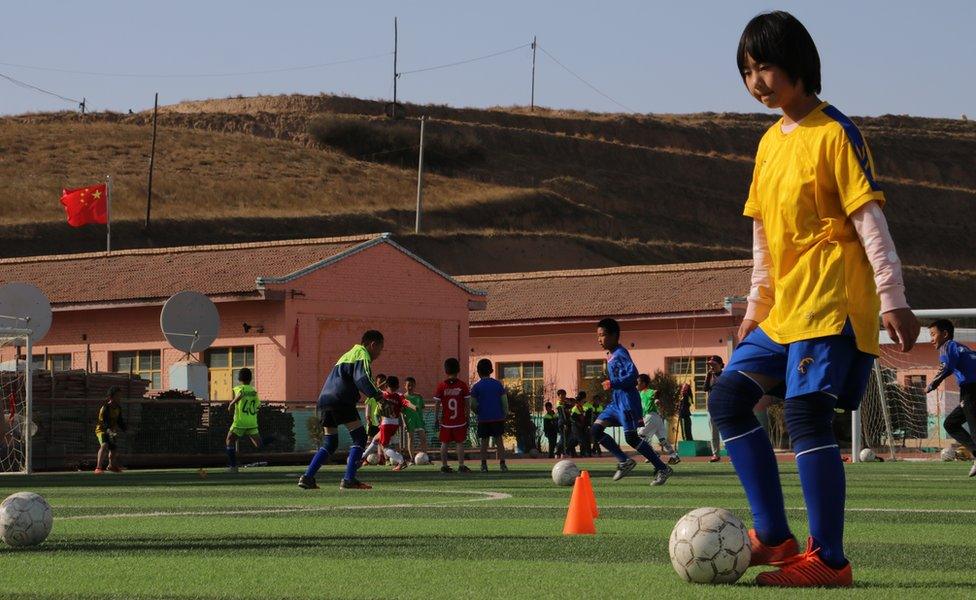
Wang Chun was actually scouted by Shaanxi, we learned later
Several weeks after leaving Gansu, we learn that Wang Chun never made it to the audition at the fancy football academy down south.
While she was waiting for her chance to try out, another opportunity popped up. The 12-year-old was scouted by the youth provincial football team in Shaanxi, a province in central China.
"The Shaanxi team is good - it's ranked in the top eight in China," coach Mr Ma explains.
"And the team has offered that, if she doesn't have a successful football career, they've promised her admission into Shaanxi University. You have to understand, being able to enter university by playing football is the kids' and families' dream. So she and her parents agreed."
Wang Chun has now been at the new team for a month. She takes classes in the mornings and trains every afternoon, six days a week.
"When I first got here, I was very scared - new classmates, new pressure," she said.
"But it's better now. The captain of my team has already been chosen by the national team and she's already gone to the US for training."
The 12-year-old has already surpassed her parents' ambitions by making it out of the mountains. But her ultimate goal - playing for China - remains in sight.
"I really want to train to be a national player and I still need to work hard for that," she says. "But I have no regrets."
- Published3 August 2018
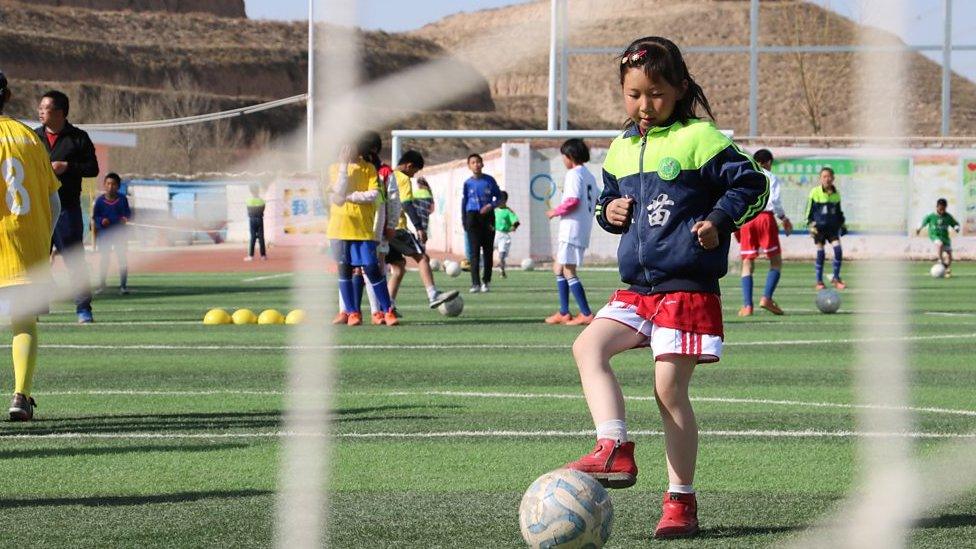
- Attribution
- Published9 May 2016

- Published6 September 2017
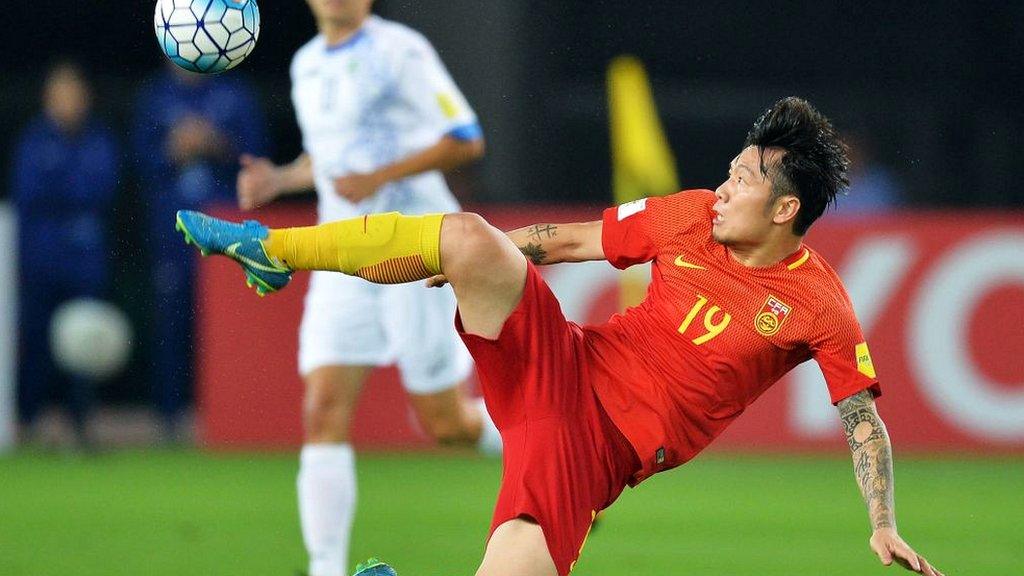
- Published26 January 2016
